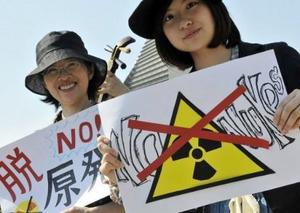Nuclear matters Japan's prime minister pushes to end nuke program
Japan could soon be following in the footsteps of Germany and shut down its nuclear energy plants; at a televised press conference on Wednesday, Prime Minister Naota Kan pushed to end Japan’s nuclear program; “Japan should aim for a society that does not depend on nuclear energy,” Kan said

Demonstrators seek end of nukes, Prime Minister listens // Source: physorg.com
Japan could soon be following in the footsteps of Germany and shut down its nuclear energy plants.
At a televised press conference on Wednesday, Prime Minister NaotaKanpushed to end Japan’s nuclear program.
“Japan should aim for a society that does not depend on nuclear energy,” Kan said. “We should reduce our dependence in a planned and gradual way, and in the future, we should aim to get by with no nuclear energy.”
“When we think of the magnitude of the risks involved with nuclear power, the safety measures we previously conceived are inadequate,” he added.
Kan’s remarks are the strongest he’s made against nuclear power since the 11 March nuclear crisis began at the Fukishima Daiichi Nuclear Power Plant which was caused by the colossalearthquake and tsunami.
The prime minister did not reveal any specifics on a proposed timeline to move Japan away from nuclear power or how the nation would transition to other sources of energy. Currently alternative energy like solar, wind, and geothermal account for just 1 percent of Japan’s electrical output compared to nuclear which provides nearly 30 percent.
Following the multiple meltdowns at the Fukushima Daiichi plant, many of Japan’s nuclear reactors were shut down for safety reasons, resulting in energy shortages across the country. Only nineteen of Japan’s fifty-four reactors are in operation, and officials say the reactors must first undergo stress tests to ensure that they are safe before they can be reopened. The prime minister has not provided any specifics on what the stress tests would look like or when they would occur and industry officials are growing impatient.
With Kan’s support levels at record lows, it is unclear if he will be able to generate the political support needed for such a plan as it would represent a major shift in policy. Japan had originally planned to increase its nuclear output to generate more than 50 percent of the country’s energy by 2030, however public opinion polls seem to suggest that an overwhelming majority of people would support ending the country’s nuclear program.
According to a poll conducted by The Nikkei, almost 70 percent of Japanese people oppose restarting the reactors, despite the energy shortages. In addition, in an Asahi Shimbumpoll last month, more than 74 percent or respondents said they support a plan to phase out nuclear energy and eventually abandon it all together.
Kan’s anti-nuclear position has not improved his popularity, as of 4 July, a Kyodo News poll found that his support rate was at an all-time low of 19 percent. The prime minister said that he would step down once Japan had made more progress in recovering from the devastating 11 March earthquake and tsunami that left more than 22,000 dead and thousands more displaced.
